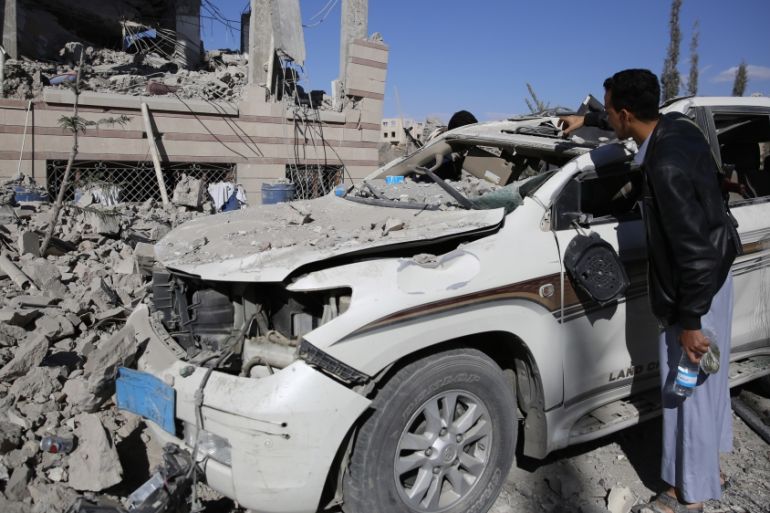Coalition denies using cluster bombs in Yemen
Rights monitor’s charges, which caused row between government and UN, dismissed as “very weak report” without evidence.

The Arab coalition in Yemen has denied accusations of dropping cluster bombs in the country after UN chief Ban Ki-moon said their use may be a “war crime”.
The coalition “denies using cluster bombs in Sanaa”, the Yemeni capital, spokesman Brigadier-General Ahmed al-Asseri told AFP news agency on Sunday.
Keep reading
list of 4 itemsMSF suspends work in Haiti emergency centre after armed group kills patient
‘It gave me a purpose’: Surf therapy transforms lives in South Africa
British-Ghanaian boxer Joshua Buatsi: ‘I can’t be the only one benefitting’
He was specifically responding to a report issued on Thursday by the US-based Human Rights Watch (HRW), which quoted residents describing a January 6 attack in a manner consistent with cluster-bomb use.
|
|
“I think it’s a very weak report,” Asseri said. “They didn’t show any evidence.”
He said HRW mentioned a type of cluster munition “that doesn’t exist in our stock”, adding that 90 percent of coalition operations in Sanaa are directed against Scud missile launchers.
“You cannot use a cluster bomb against Scud launchers,” Asiri said.
His comments came a day after Yemen’s government apparently reversed a decision to expel the head of the country office of the UN High Commissioner for Human Rights (OHCHR) after an appeal from Ban.
An AFP report identified the official as George Abu al-Zulof and said Yemen had accused him of lacking impartiality in his assessments of the human rights situation in the Arabian Peninsula country.
“Because of the fuss created around the matter and caused by media reports … the Yemeni government has decided to give more time to review the relationship with the OHCHR, in order to uphold the values of human rights,” said a letter from Yemen’s UN mission to Ban, seen by Reuters on Saturday.
Earlier in the week, the OHCHR office in Yemen said it had received allegations that coalition forces used cluster bombs in attacks.
Air strikes by the Arab coalition, assembled by Saudi Arabia, have intensified since the humanitarian ceasefire in Yemen ended on January 2.
For its part, the coalition has accused the Iran-allied Houthi fighters and their allies of firing ballistic missiles towards Saudi cities and border posts, as well as hampering aid operations in Yemen.
READ MORE: UN criticises Yemen’s expulsion of rights official
Separately, HRW said in a new report on Sunday that Houthis have “arbitrarily detained and forcibly disappeared dozens of people” in Sanaa, because of their links to the Islah political party, which is opposed to the rebels.
“The Houthi authorities should safeguard the rights of everyone in detention, immediately release all those held arbitrarily, and grant family members, lawyers, and independent monitors immediate access to detention sites to reduce the risk of abuse,” an HRW statement said.
There has been widespread international concern about the high numbers of civilian casualties in Yemen.
The Arab coalition has been supporting Yemeni forces since March against the Houthis and their allies, who seized territory from the internationally recognised government.
